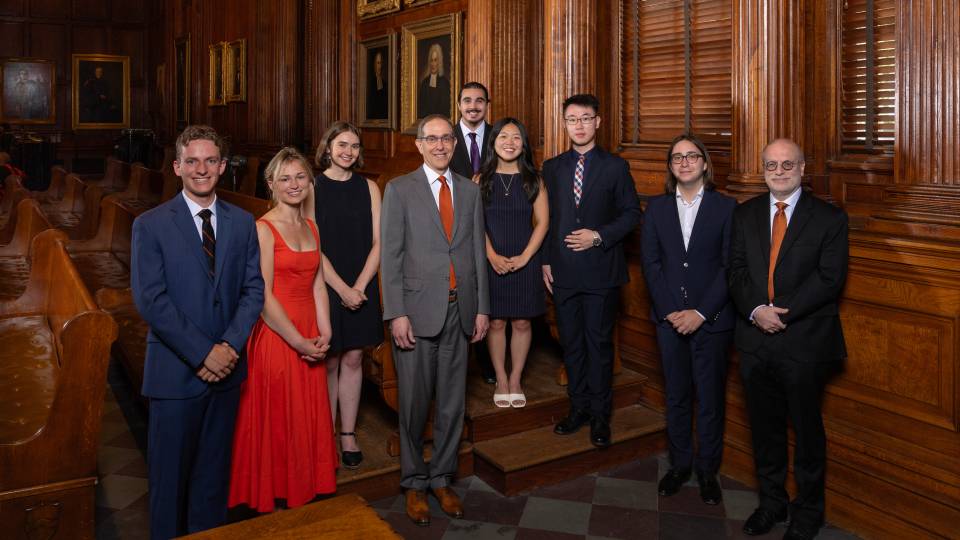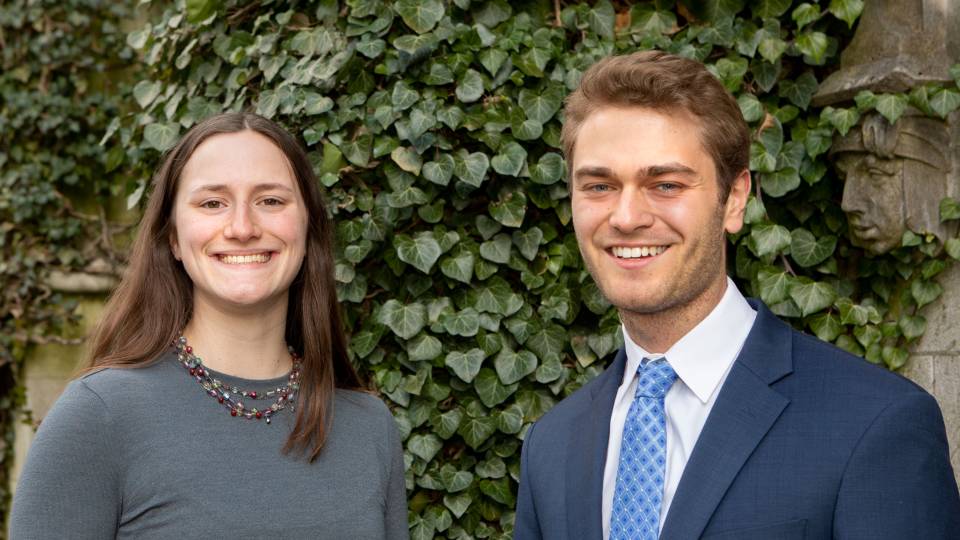Pyne Prize winners Jennifer Nwokeji (left) and Avi Attar (right).
Princeton University seniors Avi Attar and Jennifer Nwokeji are the recipients of the 2025 Moses Taylor Pyne Honor Prize, the highest general distinction conferred on an undergraduate. They will be recognized at Alumni Day on campus Saturday, Feb. 22.
The Pyne Honor Prize, established in 1921, is awarded to the senior who has most clearly manifested excellent scholarship, strength of character and effective leadership. Previous recipients include U.S. Supreme Court Justice Sonia Sotomayor and the late Princeton President Emeritus Robert F. Goheen.
Avi Attar

Avi Attar
Attar, from Newton, Massachusetts, is majoring in the School of Public and International Affairs (SPIA) and minoring in computer science. He was president of the Undergraduate Student Government (USG) and is a recipient of the Shapiro Prize for Academic Excellence.
Attar said the Pyne Prize is a “great honor” that serves as a reminder of the opportunities he has been afforded inside and outside the classroom at Princeton.
“Since coming to Princeton, I've had a wealth of opportunities, from taking classes with world-class professors and inspiring classmates to extracurricular exploration and travel,” he said. “This prize is a reminder of those opportunities and the professors, classmates and other members of the Princeton community who made them possible.”
Attar said that Princeton’s “wonderfully supportive environment” has allowed him to explore and develop interests in new areas of study like computer science. “Through Princeton experiences, I've also been able to meet policymakers, political leaders, entrepreneurs and so many other people making a positive impact on the world,” he said.
Harold James, a professor of history and international affairs, taught Attar in the course “Financial History.” “He is a student of very great distinction,” James wrote in a letter of recommendation. “He represents the absolute best of Princeton intellectual life.”
During Attar's leadership, the USG addressed student-facing issues and successfully advocated for changes to the academic calendar, including the implementation of staggered final assignments; worked with the University to increase access to mental health resources and lower copays; and organized events centered on fostering a strong sense of community through the arts, athletics and constructive dialogue on campus.
Ian Deas, associate dean of undergraduate students, called Attar “a once-in-a-generation leader, possessing unimpeachable integrity and a commitment to the well-being of his fellow students and Princeton University.”
As president of the USG, Deas said, Attar “ensured students’ voices were represented equitably, facilitated dialogue in difficult situations and empowered the USG to contribute meaningfully across University priorities.”
In addition to his student government service, Attar co-chaired the executive board of the Pace Center for Civic Engagement’s Community House program, which supports local youth and families. He was a Pace Center Service Focus fellow in the Public Interest Technology cohort and spent a summer as a legal intern at the 11th Judicial Circuit of Florida court with support from the Princeton Internship in Civic Service (PICS) program.
He was also a Siegel Public Interest Technology Summer Fellow, interning at the Federal Trade Commission’s Division of Financial Practices in Washington, D.C., where he worked on cases related to AI and consumer protection.
On campus, Attar was a research assistant for Stephen Macedo, the Laurance S. Rockefeller Professor of Politics and the University Center for Human Values. He was also a member of Princeton’s sailing team.
Attar’s senior thesis, an analysis of the CHIPS and Science Act of 2022, combines his academic and extracurricular experiences related to technology and public policy. He will investigate the political and economic factors that led to the act's bipartisan support and study its implementation thus far.
Ethan Kapstein, a senior research scholar and lecturer at SPIA with the rank of professor in public and international affairs, is Attar’s thesis adviser. Kapstein is also the executive director of the Empirical Studies of Conflict Project at SPIA.
“Avi’s pursuing an ambitious, multi-methods approach that includes interviews with public officials,” Kapstein said. “I am confident that Avi will make a serious contribution to a critical policy issue.”
In the future, Attar said he hopes to build on his interests in technology and policy in a way that leverages innovation to “to improve people's quality of life.”
In addition, Attar is co-chair of the Peer Representatives to the Princeton Honor Committee, a member of SPIA’s Student Advisory Committee and a peer academic adviser in Rockefeller College. Last summer, Attar interned at Jane Street in New York City.
Jennifer Nwokeji

Jennifer Nwokeji
Nwokeji, from Harrisburg, Pennsylvania, is majoring in molecular biology and minoring in bioengineering and African studies. She hopes to enter an M.D./Ph.D. program after graduation.
She is a recipient of the Shapiro Prize for Academic Excellence and the Department of Molecular Biology’s Evnin ‘62 Senior Thesis Fund, which supports her research on a model system for malaria in the lab of John Jimah, assistant professor of molecular biology and the James A. Elkins, Jr. '41 Preceptor in Molecular Biology.
Upon learning she had received the Pyne Prize, Nwokeji said she “almost cried” and immediately thought of her Nigerian immigrant parents. Being honored with the Pyne Prize, Nwokeji added, “felt like I was sort of being awarded and recognized just for being me.”
Not knowing anyone from her high school who had attended Princeton, Nwokeji said she was initially nervous about coming to campus.
“I just went in thinking I'm going to do the best that I can, both academically and with my volunteering and community work,” she said.
Jimah called Nwokeji “a true joy to work with — a brilliant mind and a natural leader."
“She embodies the traits associated with Pyne Prize recipients through her outstanding academic performance, character, and commitment to global health and biomedical science,” Jimah wrote in a letter of recommendation. She has “demonstrated not only remarkable intellectual curiosity, creativity, and scientific insight but also the resilience and dedication required for groundbreaking research,” he added.
Nwokeji joined the Jimah Lab, which analyzes the structural biology of parasitic and human cells, as a first-year student through the Office of Undergraduate Research Student Initiated Internship Program and has worked there every academic year since.
Her senior thesis is an evolution of her junior paper. Nwokeji works with Jimah and Amari Tankard, a fifth-year graduate student in molecular biology, using cryo-electron microscopes and biochemical tools to study the structure and function of proteins and “understand how parasitic infection works.”
Ultimately, Nwokeji said, she hopes to develop new therapeutics for diseases disproportionately affecting marginalized communities around the world.
“Jenny has immense potential to become a leading physician and biomedical scientist,” Jimah said in his recommendation, noting he “fully expects” her undergraduate research findings to “be published in a scientific journal.”
Nwokeji has expanded her interest in public health as an intern with the Florida Department of Health, where she tracked the spread of enteric disease in Palm Beach County, translated for Spanish-speaking clinic patients and helped organize health fairs with support from the Center for Career Development’s Summer Social Impact Internship Fund. She also had a Princeternship at the biopharmaceutical company RAPT Therapeutics, and has volunteered at the University of Pittsburgh Medical Center’s Community Osteopathic Hospital in Harrisburg every winter break.
Matthew Lazen, the assistant dean of studies for Butler College, described her as a student who truly embodies the Pyne Prize spirit of service and achievement.
“After twenty years at Princeton, I know well how exceptional Pyne Prize winners must be — in academics, character and service to Princeton,” he wrote in a letter of recommendation. “Not only is she a consummate scholar, but she always goes the extra mile for others.”
In addition to her academic achievements, Nwokeji holds various leadership, mentoring and service roles on campus. She is an advanced peer tutor in chemistry and biology at the McGraw Center for Teaching and Learning, a peer academic adviser in Butler College, a Health Professions Advising peer adviser and a mentor in the Carl A. Fields Center’s Princeton University Mentorship Program.
Nwokeji has served as president of the Princeton Black Premedical Society, treasurer of the Scully Co-Operative student-run food cooperative, and treasurer and founding board member of the Princeton Nigerian Students Association.
Nwokeji was a stylist for the student-run TigerTrends fashion magazine, and a gallery attendant at the Princeton University Art Museum’s Art@Bainbridge and Art on Hulfish galleries in downtown Princeton. She has been a volunteer with the Trenton Area Soup Kitchen and plans to resume that work this spring.
All University programs and activities are open to all eligible participants without regard to identity (or other protected characteristics).







